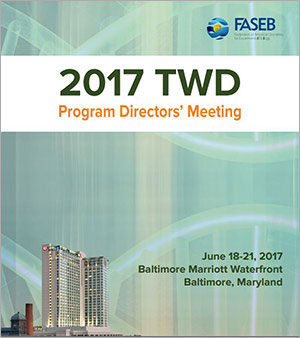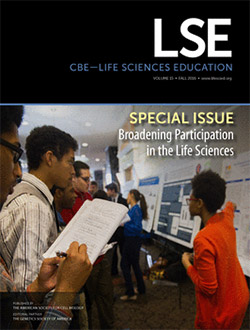The National Institutes of Health (NIH) is making a number of changes to the fellowship application and peer review process for due dates on or after January 25, 2025. For details, visit the Revisions to the NIH Fellowship Application and Review Process webpage. New funding announcements and application instructions will be released in the coming months.
Continue reading “Upcoming Changes to NIH Applications for NIGMS Fellowships”Tag: Trainees
Notes from the 2017 Training, Workforce Development, and Diversity Program Directors’ Meeting
 The 2017 Training, Workforce Development, and Diversity (TWD) Program Directors’ Meeting, organized through a grant to the Federation of Associations for Experimental Biology, took place June 18-21 in Baltimore. This biennial meeting brought together the community of faculty, staff and administrators who manage TWD undergraduate and predoctoral training programs across the nation to network, share best practices for program improvement and connect with NIGMS staff. This year, participants presented more than 100 posters. Plenary sessions and keynote talks described innovative approaches for training and evaluation, efforts to enhance diversity in the biomedical workforce and more.
The 2017 Training, Workforce Development, and Diversity (TWD) Program Directors’ Meeting, organized through a grant to the Federation of Associations for Experimental Biology, took place June 18-21 in Baltimore. This biennial meeting brought together the community of faculty, staff and administrators who manage TWD undergraduate and predoctoral training programs across the nation to network, share best practices for program improvement and connect with NIGMS staff. This year, participants presented more than 100 posters. Plenary sessions and keynote talks described innovative approaches for training and evaluation, efforts to enhance diversity in the biomedical workforce and more.
Highlights included:
- Alison Gammie, director of NIGMS’ TWD division, outlined the new predoctoral T32 funding opportunity announcement (FOA) in her presentation. The FOA will emphasize cultivating a diverse pool of well-trained scientists and will focus on skills and career development, the importance of scientific rigor and reproducibility, and the value of inclusive and supportive training environments. It is scheduled for publication this fall.
- Principal investigators of administrative supplements to NIGMS predoctoral training grants presented their approaches to modernizing biomedical graduate education through increased focus on scientific rigor, career and skill development, and training opportunities.
- Melanie Sinche, director of education at the Jackson Laboratory for Genomic Medicine and author of “Next Gen PhD: A Guide to Career Paths in Science,” shared her research on recent STEM Ph.D. graduates’ career pathways. She found that the majority of recent STEM Ph.D. graduates who responded to her survey expressed satisfaction with their work, and they chose their employment primarily for “intellectual challenge” and “flexibility.”
- Erin Dolan, a professor at the University of Georgia, talked about effective strategies for science education. Citing a variety of references, Dolan presented on how the research training community can help students develop interests and careers in the sciences by incorporating models from educational research and social cognitive career theory. This approach is intended to nurture greater enthusiasm for science because it’s based on how students learn and make career decisions. Later, members of the Diversity Program Consortium’s Coordination and Evaluation Center led a workshop on evaluation techniques and shared some tools with attendees that may aid in more effectively evaluating training programs.
- In his Message from the Director, Jon Lorsch included an overview of ongoing NIGMS priorities, including the expansion of the Maximizing Investigators’ Research Award (MIRA) program. He also announced that NIGMS is the new home for the Science Education Partnership Award (SEPA) program, which supports educational and career activities for pre-K to grade 12 students, as well as other public outreach programming. SEPA strongly complements the rest of NIGMS’ workforce diversity and training portfolio. Examples of SEPA projects include mobile laboratories that bring science to rural communities, professional development for teachers and media-based projects like the PBS NewsHour Student Reporting Labs.
To view more of the presentations and to access abstracts for the poster sessions, please visit the 2017 TWD Program Directors’ Meeting resources page.
Special Issue of CBE-Life Sciences Education Advances the Science of Broadening Participation
NIGMS’ longstanding support of and commitment to programs that promote workforce diversity have contributed to significant progress, but persistent representation gaps along demographic lines remain in the ranks of both independent investigators and scientific leadership. These gaps lead to the loss of valuable contributors from the talent pool and limit the ability of the biomedical community to identify and address critical scientific and societal concerns. A special issue of CBE-Life Sciences Education, published September 1, provides the broader community with a chance to assess the progress made and plan for a future in which we cultivate and harness all available talent.

The papers in this issue, which I edited with Pat Marsteller of Emory University, fit four main themes:
- Innovative and effective interventions or approaches for broadening participation.
- Mechanistic explanations for why certain approaches have been effective.
- Novel insights about institutional and systemic factors that influence broadening participation efforts.
- Syntheses of research and practices that provide a “plan of action” heading forward.
NIGMS leadership, staff and grantees authored 11 of the 35 features, editorials, essays and articles in the special issue. While all of the papers focus on topics of importance to developing a diverse scientific workforce, I wanted to call your attention to a few representative articles:
Training Career Outcomes
Last week, I wrote to NIGMS-funded T32 program directors to encourage them to inform students about trainee career outcomes. Because this topic is also relevant to the broader community, I’d like to share the message here.
Dear NIGMS T32 Training Grant Program Director:
At the June 2015 meeting of NIGMS training, workforce development, and diversity program directors, Peter Preusch, Dick Okita and I discussed the importance of making post-training career outcomes available to current and prospective students. The goal of collecting and sharing data on Ph.D. career outcomes is consistent with recommendations of the Biomedical Research Workforce Working Group of the Advisory Committee to the Director, NIH. This topic has also been addressed by the Association of American Medical Colleges, the Council of Graduate Schools and a recent Molecular Biology of the Cell article.

